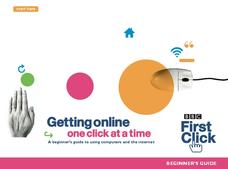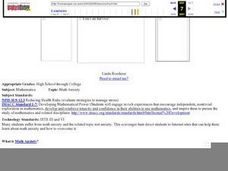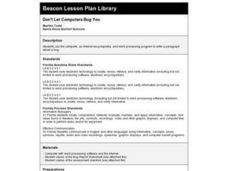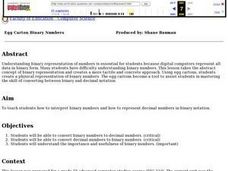Curated OER
Computer Science Education Week
Equip students for the 21st century by exploring the fun of computer science.
Curated OER
Technology at Work
Young scholars complete a research project. In this technology lesson, students discuss the term technology and when technology began. Young scholars work in groups to brainstorm a list of the top ten technological advances in...
BBC
Getting Online One Click at a Time
The Internet is a vast and fascinating place to be, but you have to know how to get there first! Use a helpful guide to become computer savvy in no time. It covers computer basics such as keyboarding and hardware, and goes into e-mail,...
Computer Science Unplugged
Marching Orders—Programming Languages
Computers need precise directions to complete a task. Class members experience what it is like to program a computer with an activity that asks one pupil to describe an image while classmates follow the directions to duplicate the picture.
Computer Science Unplugged
Card Flip Magic—Error Detection and Correction
I can find the error in an array of cards? After watching a demonstration class members search for the error is the provided cards. The resource provides a real-life example of using ISBN numbers in error detection and using check sums.
Beauty and Joy of Computing
Building Your Own Blocks
Isn't building with blocks an activity for toddlers? The third lab of a five-part unit teaches young computer scientists how to create their own block instructions for programming. They use these blocks to create geometric figures, spell...
We are Teachers
Must-Have Posters for the One-to-One Classroom
Are your learners using personal tablets or working in a computer lab this year? Then you don't want to miss these humorous and on-point posters to display around the room on proper technology use.
Curated OER
You Can Survive! (Math Anxiety)
Students explore strategies to manage stress in the math classroom. Through various activities, students discover the characteristics of math anxiety and determine if this affects them. Using computer technology, students complete a...
Curated OER
Living in a Digital World
What does it mean to be a good digital citizen? Is it the same as face-to-face communication? In small groups, learners discuss the differences between digital and non digital life, how they are different and what each environment can...
Curated OER
Computer Basics
Young scholars review basic terminology that they would use to reference computers in media arts. In this computer terminology lesson plan, students use terms frequently.
Curated OER
My Pocket IT Glossary-- A-Z of Computer Words (Nouns)
In this language arts worksheet, students learn the meanings of 12 computer technology vocabulary words. Students examine 12 small boxes with one word in each. There are no directions but students could write definitions or sentences.
Curated OER
My Pocket IT of Computer Words- Nouns
In this language arts and technology worksheet, students become familiar with 12 nouns pertaining to computer technology by making a pocket glossary.
Curated OER
Hector's World - Lesson Plan - Interactive Episode - Computer Security: "Oops"
Learners examine the need for strong passwords when working online. In this computer password lesson, students access an animated sequence at the given web site. They determine the need for computer passwords when working on shared...
Curated OER
Don't Let Computers Bug You
Learners write paragraph about a bug using the computer, an Internet encyclopedia, and word processing program.
Curated OER
Creating a Story Map Using Kidspiration
Fourth graders use computer software, Kidspiration, to create a graphic organizer detailing main characters, setting, problem, solution, and theme of their favorite short story. Students also discover how graphic organizers can help them...
Curated OER
Digital Storytelling
Scholars of all ages can use the various tools of technology to construct and illustrate a story. Utilizing this resource, learners work with a partner to brainstorm and draft a story based on personal experience. They use computer...
TryEngineering
Arduino Blink Challenge
Who knew turning a light on and off could be so complicated? In the lesson, pupils use Arduino boards to learn about computer codes and programs. They program an Arduino to make a light turn on and off at certain time intervals.
Code.org
Controlling Memory with Variables
Not all variables are created equal. Discover how variables in computer science are different from variables in math class. Scholars learn to work with variables in computer programming by developing a mental model for how variables...
Microsoft
Variables
You won't want to replace the resource with anything else. Future computer scientists use Minecraft to learn about variables in computer coding. They engage in several activities to master the variable code block, then apply it in an...
Curated OER
Egg Carton Binary Numbers
Learners take the abstract concept of binary representation and create a more tactile and concrete approach. Using egg cartons, they create a physical representation of binary numbers. The egg cartons become a tool to assist students in...
Autodesk
AutoCAD 360
Take your drafting and design projects on the go with with this mobile computer-aided design program. Allowing users to view, edit, and share their work with others, this is a great resource for developing the technical drawing skills of...
Teach Engineering
Storing Android Accelerometer Data: App Design
There's an app for that! Pupils learn to build an app that will store data on an Android. The instructional activity introduces class members to the tiny database, TinyDB, for Android devices. A video tutorial provides an example that...
Teach Engineering
Android App Development
Building an accelerometer app for your Android device. Groups develop an app that uses the accelerometer on an Android device. The purpose of the activity is to reinforce the programming design. The post activity assessment challenges...
Beauty and Joy of Computing
Building an App
Create your own app with the first lab of a five-part unit. Future computer scientists learn the basics of programming a game application. They use a given software program to design an app where users try to click on a moving sprite as...

























